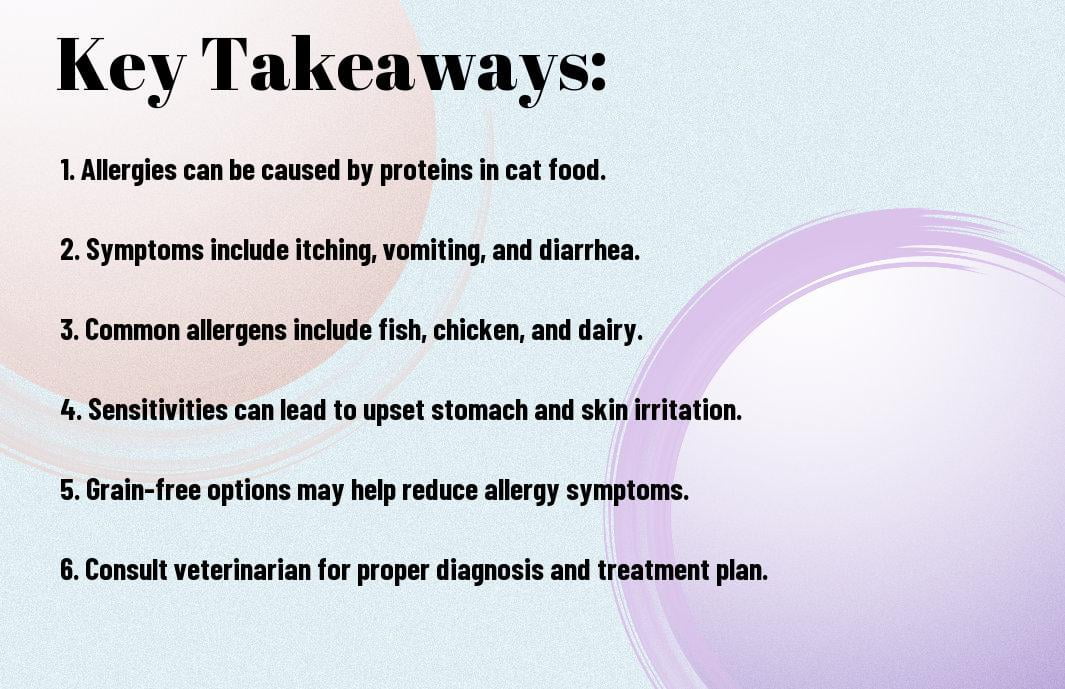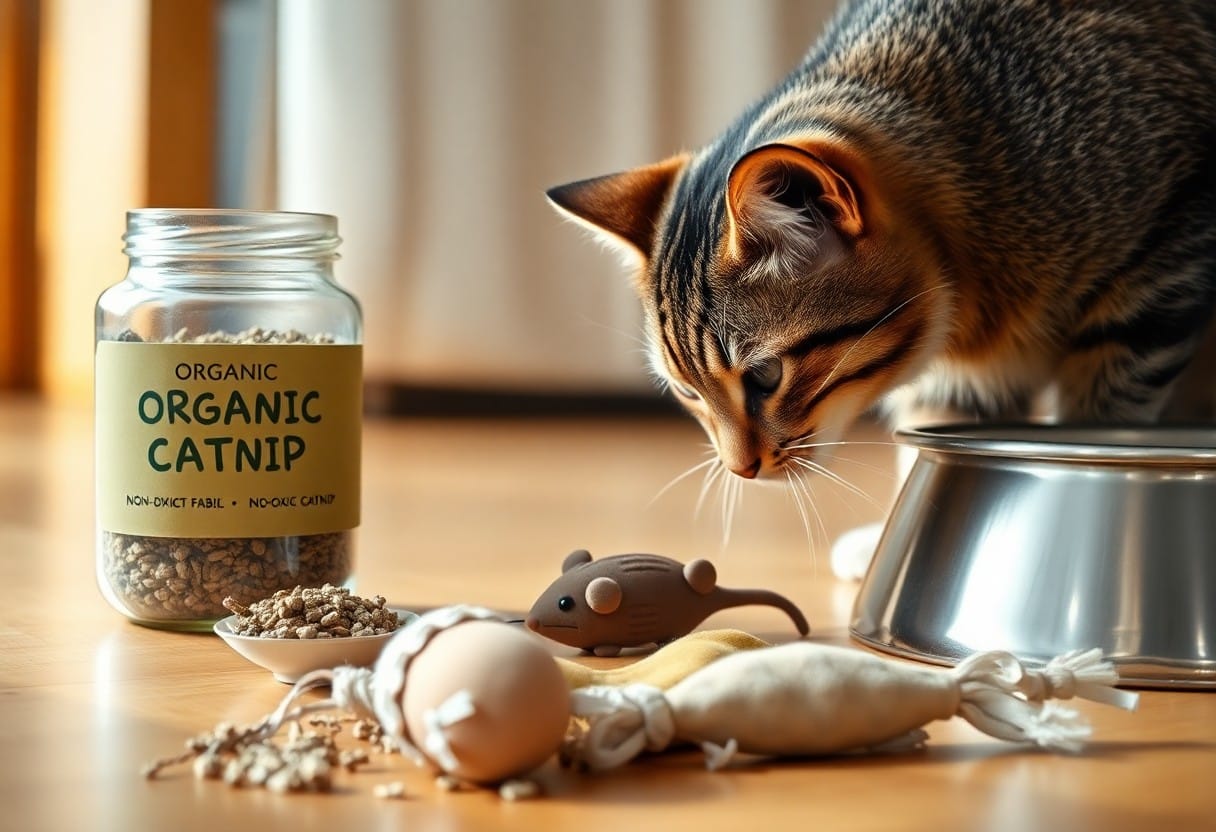With more pet owners becoming attentive to their feline friends’ health, understanding common cat food allergies and sensitivities is crucial. Cats can develop adverse reactions to certain ingredients present in their diet, leading to various symptoms that can affect their quality of life. By recognizing these allergies and sensitivities, pet owners can make informed decisions about their cat’s nutrition to ensure their furry companions lead a healthy and happy life.


Basic Concepts
Difference Between Food Allergies and Food Sensitivities
Assuming your cat is showing signs of a potential food-related issue, it’s imperative to understand the difference between food allergies and food sensitivities. Food allergies are immune system reactions triggered by specific ingredients in your cat’s diet. These allergies often manifest as skin issues, digestive problems, or even respiratory distress. On the other hand, food sensitivities are more subtle and typically involve digestive upset or intolerances to certain ingredients without an immune system response. Understanding whether your cat is experiencing an allergy or sensitivity can help you tailor their diet appropriately.
Understanding Feline Biology and Dietary Requirements
Requirements
Basic
Common Food Allergens in Cats
Identifying Top Feline Allergens
Some common food allergens in cats include proteins such as beef, dairy, and fish. These proteins are known to trigger allergic reactions in sensitive felines. Additionally, grains like wheat and corn can also be problematic for some cats, causing allergic symptoms.
Identifying the specific allergen affecting your cat can be challenging as it often requires a process of elimination. Consulting with a veterinarian and conducting food trials can help pinpoint the allergen causing the reaction in your feline companion.
How Allergens Affect a Cat’s Body
For cats, food allergens can trigger a range of symptoms including skin issues like itching, scratching, and hair loss. Digestive problems such as diarrhea, vomiting, and flatulence may also indicate a food allergy in cats. In severe cases, allergic reactions can lead to respiratory issues like coughing and wheezing.
Diagnosing Food Allergies and Sensitivities
Despite the challenges in pinpointing food allergies and sensitivities in cats, there are diagnostic methods that can help to identify the culprit ingredients. The two main approaches used by veterinarians are the elimination diet and diagnostic tests.
The Elimination Diet: Purpose and Process
To diagnose food allergies or sensitivities in cats, veterinarians often recommend an elimination diet. The purpose of this diet is to remove all potential allergens from the cat’s food and introduce novel protein and carbohydrate sources that the cat has not been exposed to before. This process can take around 8-12 weeks to see if the cat’s symptoms improve.
Diagnostic Tests Available to Veterinarians
Tests available to veterinarians for diagnosing food allergies and sensitivities in cats include blood tests, skin tests, and saliva tests. Blood tests measure the levels of antibodies produced by the immune system in response to specific allergens. Skin tests involve injecting tiny amounts of allergens under the cat’s skin to observe any reactions. Saliva tests check for the presence of certain antibodies in the cat’s saliva that indicate an allergic response.
Allergies
If your cat is showing symptoms of food allergies or sensitivities, it is crucial to consult with a veterinarian to determine the best course of action for diagnosis and treatment. Allergy testing can help to identify the specific ingredients causing the allergic reactions, allowing for the formulation of a suitable diet plan to manage your cat’s condition effectively. Regular monitoring and adjustments to the diet may be necessary to ensure your cat’s health and well-being.
Managing a Cat’s Allergies
Your cat’s allergies can be managed effectively with the right diet and care. Understanding what triggers your cat’s allergies is the first step in managing them. Here are some strategies to help you navigate and alleviate your cat’s allergies.
Navigating Commercial Cat Foods
Cats with food allergies often benefit from specialized hypoallergenic cat foods. These foods are made with limited ingredients, making it easier to pinpoint and avoid allergens. Look for commercial cat foods labeled as ‘limited ingredient diet’ or ‘single protein source’ to help manage your cat’s food allergies. It is important to read the ingredients list carefully and choose a high-quality cat food that meets your cat’s nutritional needs.
The Role of Homemade Diets and Novel Proteins
Allergies in cats can sometimes be triggered by common ingredients found in commercial cat foods. In such cases, a homemade diet can be a good alternative. Homemade diets allow you to have more control over the ingredients, making it easier to avoid allergens. Novel proteins such as venison, rabbit, or duck can also be introduced to your cat’s diet as they are proteins that your cat may not have been exposed to before, reducing the risk of triggering allergies.

Preventative Measures and Early Detection
The Importance of Early Interventions
Measures to prevent cat food allergies and sensitivities are crucial in maintaining your pet’s health. By introducing new foods gradually and keeping a close eye on their reactions, you can identify and address any issues promptly. Early interventions can prevent the development of severe allergies and reduce discomfort for your feline friend.
Monitoring and Documenting Dietary Reactions
Monitoring your cat’s dietary reactions is important in managing potential allergies or sensitivities. Keep a food diary to track what your cat eats and any subsequent reactions they may have. Documenting this information can help your veterinarian identify patterns and make informed recommendations for dietary adjustments or allergen testing.
Be observant of your cat’s behavior, skin condition, stool quality, and overall health after mealtime. If you notice any unusual symptoms such as itching, vomiting, diarrhea, or lethargy, consult with your veterinarian immediately.
Detection
Early detection of food allergies and sensitivities is key to preventing discomfort and health issues for your cat. By closely monitoring your pet’s reactions to different foods and promptly addressing any concerns, you can ensure they receive the appropriate care and dietary modifications needed for a happy and healthy life.
The Human-Animal Bond and Diet Management
Understanding the Emotional Impact on Owners
On a daily basis, pet owners share a special bond with their cats that goes beyond just companionship. When a beloved feline companion is diagnosed with a food allergy or sensitivity, it can be emotionally challenging for the owner. The frustration of seeing your cat uncomfortable, coupled with the confusion of identifying the allergen in their diet, can lead to feelings of helplessness and worry.
It is crucial for owners to recognize and address the emotional impact of their cat’s condition. By understanding the impact it has on both the cat and themselves, owners can better manage their own emotions and provide the necessary care and support for their feline friend.
Educating Owners for Better Compliance
An vital aspect of managing a cat’s food allergy or sensitivity is educating owners about the importance of dietary compliance. Owners must understand the significance of following the prescribed diet plan strictly to ensure their cat’s well-being. This includes being diligent in reading food labels, avoiding feeding human food scraps, and providing only the recommended diet.
The more informed and educated an owner is about their cat’s dietary needs, the better equipped they will be to adhere to the necessary dietary restrictions. Compliance with the diet plan is vital in alleviating symptoms and improving the overall health and quality of life for the cat.
Conclusion
So, understanding common cat food allergies and sensitivities is crucial in providing our feline friends with a healthy and well-balanced diet. By knowing the signs and symptoms of allergies such as vomiting, diarrhea, or itchy skin, pet owners can take the necessary steps to identify and address any issues related to their cat’s diet. Additionally, being aware of common food allergens like protein sources, grains, and additives can help in selecting suitable cat food products that meet the dietary needs of cats with sensitivities.
Bear in mind, consulting a veterinarian for proper diagnosis and guidance is imperative when dealing with cat food allergies. They can recommend specific diets or conduct allergy tests to pinpoint the root cause of the sensitivity. With the right approach and a bit of patience, pet owners can manage their cat’s food allergies effectively, ensuring their furry companions remain happy, healthy, and thriving.
FAQ
Q: What are common cat food allergies?
A: Common cat food allergies include sensitivities to ingredients like dairy, chicken, beef, fish, and grains. Cats can develop allergies to proteins or other components in their food.
Q: What are the symptoms of cat food allergies?
A: Symptoms of cat food allergies can include vomiting, diarrhea, skin rashes, itching, hair loss, and ear infections. In severe cases, cats may experience difficulty breathing or swelling.
Q: How can I determine if my cat has a food allergy?
A: To determine if your cat has a food allergy, you can try an elimination diet where you feed your cat a novel protein and carbohydrate source for at least 8-12 weeks. If symptoms improve, you can slowly reintroduce old foods to see if the symptoms return.
Q: What are common ingredients in cat food that may cause allergies?
A: Common ingredients in cat food that may cause allergies include dairy, chicken, beef, fish, eggs, wheat, corn, and soy. It’s imperative to read the ingredient labels carefully when selecting cat food.
Q: How can I manage my cat’s food allergies?
A: To manage your cat’s food allergies, you can feed hypoallergenic cat food recommended by your veterinarian. Avoid feeding your cat table scraps or new foods without introducing them gradually. Regular veterinary check-ups can also help monitor your cat’s condition.

















